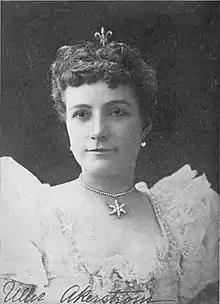Ullie Akerstrom
Ulrika R. "Ullie" Akerstrom (March 17, 1864 – August 10, 1941) was an American actress, dancer, playwright, and vaudeville performer.
Ullie Akerstrom | |
|---|---|
 Ullie Akerstrom, from a 1901 publication. | |
| Born | Ulrika Akerstrom March 17, 1870 |
| Died | August 10, 1941 (aged 71) |
| Resting place | Woodlawn Cemetery Bronx, New York, United States |
| Nationality | American |
| Other names | Ullie Akerstrom Bernard (after marriage), Ullie Akerstrom Melius (after marriage) |
| Occupation(s) | actress, dancer, playwright |
| Known for | Annette, the Dancing Girl |
| Notable work | "Toot Yer Horn", and Other Poems (1888) |
| Spouse |
Gus Bernard
(m. 1899; died 1915) George Howard Melius
(m. 1915) |
Career
.jpg.webp)
Ulrika Akerstrom was born and raised in New York City, and made her first stage appearance in Milwaukee, Wisconsin as a vaudeville performer.[1] She acted in shows including Fanchon the Cricket, The Pearl of Savoy, The Hidden Hand,[2] Annette, the Dancing Girl (1889, her New York debut),[3] Renah, the Gipsey's Daughter, A Little Busybody (1891),[4] A Strange Marriage, Under the City Lights (1898), A Beautiful Slave, a Waif of London (1898), and A Bachelor's Housekeeper (1898).[5]
Akerstrom wrote several plays and sketches during her performing years, including Viola, the Street Singer (1886), Renah, the Gipsey's Daughter (1886), Annette the Dancing Girl (1889), Miss Rosa, A Pauper's Fortune (1893), Queen of the Arena (1893), A Woman's Vengeance (1895), The Story of a Crime (1895),[6] That Smith Gal, Little Busybody, The Egyptian Dancer, and The Doctor's Warm Reception (1901).[7] Akerstrom also published a book of popular verse, "Toot Yer Horn", and Other Poems (1888).[8][9]
She retired from the stage in 1903 and lived in Brooklyn, writing sketches, plays, and lyrics. She also produced shows.[2] Works by Akerstrom from this period included A Doctor by Courtesy; or, A Jolly Mixup (1906),[10] The Widow (1910), St. Elmo (1910),[11] The Plot (1910), An Election Episode (1910), Adventures; or, The Woman Hater (1910), Vashti; or, Until Death Do Us Part (1910), The Reckoning (1911), Mental Suggestion; or, Made in Germany (1911), Mrs. Murphy's Second Husband (1911), Natasha (1911), The Eleventh Hour; or, Two Sisters (1911), A Story of the Hills (1911), The Wager (1912), The Sultan's Daughter (1912), The Sultan's Favorite (1912), Sunshine (1912), Our New Girl (1912), The Red Mask (1913), Caught with the Goods (1915), Over the Hills to the Poor House (1921), The Haunted Fliver; or, What's the Answer (1935) and Call of the King (1938).[1][12][13][14][15]
She moved to Florida by 1935, but remained active in local theatrical productions, as a performer, writer and producer.[16][17][18][19][20]
Personal life
Akerstrom married her manager, Gus Bernard, by 1899;[21] he died in 1915.[2] She married again, to George Howard Melius.[18] She died in 1941, in Willsboro, New York, aged 71 years. She was buried in Woodlawn Cemetery Bronx, New York, United States.
References
- A. D. Storms, Players' Blue Book (Sutherland and Storms 1901): 250-251.
- "Ullie Akerstrom is Visiting Here" Hartford Courant (September 15, 1915): 6. via Newspapers.com
- Alan Dale, "Drama" Epoch (May 24, 1889): 260-261.
- "A Little Busybody" The Akron Beacon Journal (November 16, 1891): 4. via Newspapers.com
- Manuscript Library list, Chemung County Historical Society.
- "Theatrical Gossip" New York Times (July 3, 1895): 8. via ProQuest
- "Southern Wisconsin's Most Charming Theater" Stoughton Opera House Friends Association.
- Ullie Akerstrom, "Toot Yer Horn", and Other Poems (1888).
- Patricia Marks, "Holy and Unholy Deacons in Late Nineteenth-Century Popular Verse" Christianity and Literature 61(2)(Winter 2012): 241-262. via JSTOR
- Ullie R. Akerstrom, A Doctor by Courtesy; Or, A Jolly Mix Up (Dick & Fitzgerald 1906).
- "St. Elmo at the Lee Avenue" The Brooklyn Daily Eagle (January 18, 1910): 7. via Newspapers.com
- Copyright Office, Catalog of Copyright Entries (Government Printing Office 1910): 699, 708, 1050.
- Copyright Office, Catalog of Copyright Entries (Government Printing Office 1911): 292, 304, 595, 596.
- Copyright Office, Dramatic Compositions Copyrighted in the United States, 1870 to 1916 (Government Printing Office 1916): 1737, 1786, 1836, 1915, 1946, 1951, 1964, 2220, 2244, 2249, 2461, 2481, 2494, 2570.
- Copyright Office, Catalog of Copyright Entries (Government Printing Office 1921): 1542.
- Copyright Office, Catalog of Copyright Entries (1935): 11.
- "First Christian Church to Give Play Tomorrow" The Tampa Tribune (January 12, 1937): 10. via Newspapers.com
- "Class Will Present Interesting Play" Tampa Times (December 6, 1938): 7. via Newspapers.com
- "Play Cast Entertains at Party for Playwright" The Tampa Tribune (November 19, 1939): 33. via Newspapers.com
- "Beta Women's Club to Sponsor Religious Drama Here Monday" Tampa Bay Times (March 17, 1940): 34. via Newspapers.com
- "Ullie Akerstrom South" Portsmouth Herald (March 4, 1899): 1. via NewspaperArchive.com
External links
 Media related to Ullie Akerstrom at Wikimedia Commons
Media related to Ullie Akerstrom at Wikimedia Commons- Works by or about Ullie Akerstrom at Internet Archive